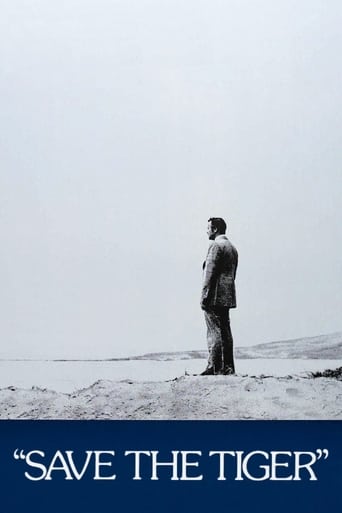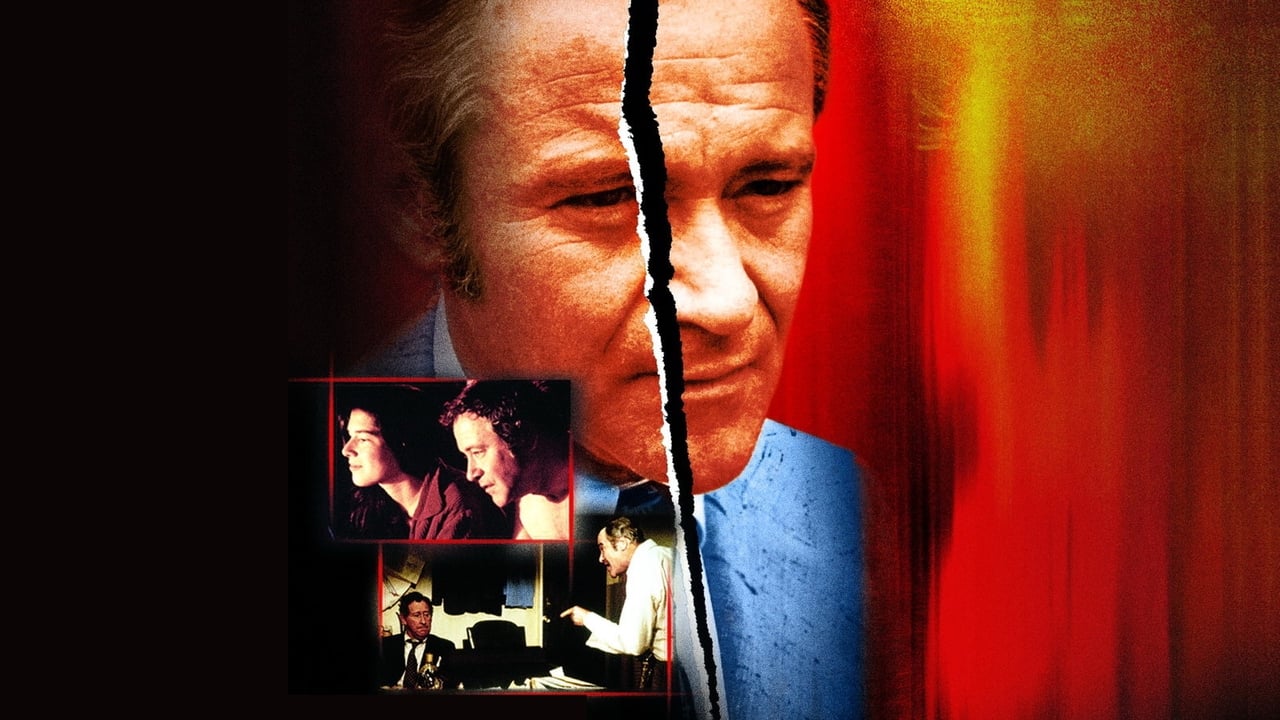gavin6942
A businessman (Jack Lemmon)'s professional struggles begin to conflict with his personal life over the course of two days.Lemmon was determined to make the movie, despite its limited commercial prospects, and so he waived his usual salary and worked for scale. The movie failed financially at the box office, but critics and viewers who saw it liked the Oscar-winning performance of Jack Lemmon as Stoner.I have to agree with the viewers and Academy on this one. Lemmon, primarily known for his comedy, is excellent in this more serious film and really carries the picture. There is not much of a plot and although it is enjoyable, I suspect there is little re-watch value. But Lemmon is great, and this is very much a one-man show, so any fan of his is going to appreciate it.
jzappa
Save the Tiger is the account of a day and a half in Harry Stoner's life. John G. Avildsen sets the tone with a deliberately paced opening scene: In a frigid dawn, the heated swimming pool steams grimly outside his Tudor manse. The film thoughtfully unfolds, and we spend what feels like real time (in a good way) comfortably easing into Harry's routine. We learn he sends his daughter to a Swiss finishing school, drives a limousine equipped with a telephone and has a wife who suggests that he see a Dr. Frankfurter to cure his nightmares. He manages a huge amount of people, he helps fuel the economy, he pays his . . . well, last year he didn't actually pay his taxes. He and his partner did a nice dance with the IRS, who hopefully won't figure that out. It opens when Harry wakes up from a nightmare, and it closes with some kids who don't need him as a utility infielder in their baseball game. Harry is a partner in a dress-manufacturing firm, and this is his big day as it's the day when he presents his new line to the out-of-town buyers. Countless things happen to Harry during the day. A buyer almost dies of a heart attack on him, he has a couple of deeply reflective conversations (one with an ancient European tailor, one with the last of the beatniks) and he plots to have one of his warehouses set on fire.And still, the entire time, his mind is on other things. He is plagued by his recollection of how simple life was in the 1940s. The title comes from a campaign to save tigers from extinction to which Stoner contributes. Then later on beatnik tells him that she read in the National Geographic about how tigers and other wild animals return to places of remembered beauty to die. Harry's place of remembered beauty is a professional baseball lineup, the Brooklyn team in the 1940s, the boys of summer. Harry was not such a bad ball player himself at one time. Now he deceives, pimps, steals designs from his rivals and finds himself negotiating with an arsonist. He wrestles with the guilt of surviving the war and yet losing touch with the ideals for which his friends died. He can't entirely grasp what went awry. His dream was to meet a budget, not being on one.Save the Tiger is indeed invigorating in its offering of apprehensions and dismay brought out into the open, the handling of notions and intimate answers to the perceived moral dilemmas of modern times, and the puncturing of stereotypes that have clenched many into angles where they cannot comprehend the people with whom they share the world and cannot truly grasp the intricacies and dichotomies that make up the layers of daily life. But Save the Tiger is primarily a monolithic piece of movie acting. Jack Lemmon carries this great movie, which he was determined to get made, by the very impact of his performance as Harry. He makes this character so persuasive that we're mesmerized. Gilford's eye and ear in his altercations with Lemmon bring a sort of contrast. They persuade us they've been having this same fight for 20 years. There are countless other good performances in the movie too, particularly Thayer David's professional arsonist and Laurie Heineman's hippie girl.There's barely a topical subject that isn't referred to, occasionally two or three times. Save the Tiger is an implosion of writer Steven Shagan's philosophical stockpile over the late 1960s and early '70s, as well as by far director Avildsen's most triumphant attempt to interpret the mold of 1930s and '40s characters, spirit and narrative into a misanthropic and progressively autonomous 1970s. Yet the movie's scrutiny of topical subjects isn't crucial to what makes it exhilarating. When Jack Lemmon and his partner Jack Gilford are feuding over the ethics of committing fraud, we aren't listening to the substance of the altercation quite as much as we're relishing the smoothness of its fabric. Lemmon and Gilford pack such vitality, such agility and banter into their carriage of the dialogue that their scenes together have a life alternately apart from the movie's indications.No, the movie's not philosophically right as rain. Nothing is! Naturally there are disfigurements in Harry Stoner's character, and we shouldn't let him go scot free feeling so idealistic and nostalgic. Yet my whole analysis is askew, it feels like. The exhilaration to be had at this movie comes from the way the performers and John G. Avildsen distill a sequence of scenes that are human, temperamental, crimson. We have spent the day with Harry, and owing to Lemmon's performance, he won't be consigned to oblivion, not like Lou Gehrig, Joe Penner or Henry Wallace.
jexline
"Save the Tiger", my all-time favorite film (followed closely by "Network") tells the life of Harry Stoner (Jack Lemmon in an Oscar-winning performance) during one day in Los Angeles, where he contemplates burning down his warehouse for the insurance money due to his "ballet with the books". As he contemplates arson, he regresses to his past and wishes for a simple and more easy time. Jack Gilfrod (also Oscar nominated and also deserving) offers strong support as Harry's partner. All in all, a touching and very emotional movie, unprecedent by any film since or before. Also Oscar nomianted for Steve Shagan's script. Better than director John G. Avildsen's follow up "Rocky" (the movie that "Network" should have won over).
JLRMovieReviews
I don't know where to begin, except to say that Jack Lemmon was one of our finest actors and is one of my personal favorites. Many can find fault with this film, but a great performance can make any ordinary film extraordinary. Each time I see it, I want to see it again. Its depiction of a man, in the supposed prime of his life, who's thoroughly unhappy with it, is unflinchingly raw and real. Its somber and bleak tone may turn off some viewers, expecting one of Lemmon's usual comedies. But, I am just in awe. Once the viewer sees him lying on the floor, saying he just wants to feel...something, they are not likely to forget it. One gets the feeling that he won the Oscar, not only because he was outstanding, but because he was willing to subject himself to a nervous breakdown just for a role. Lemmon said he did have one, in the making of this movie. He so deserved the Oscar. Save the Tiger's bitterest irony is that we have causes, funds, and drives for animals becoming extinct, but what do we do mankind? We may do more now, in the 2000s, than we did in the 70s, which is why people were ashamed of their problems then and didn't know where to turn. Finally, the ending is up to the viewer. Does Harry Stoner have a revelation, after being rejected by the boys playing? Does he feel like he's becoming extinct? Does he see himself forever living in the past? Does he feel only the futility of his life? Or, does he feel he can do something positive? What happens next to Harry Stoner is not shown, because it is up to you... because you are Harry Stoner.



 AD
AD



